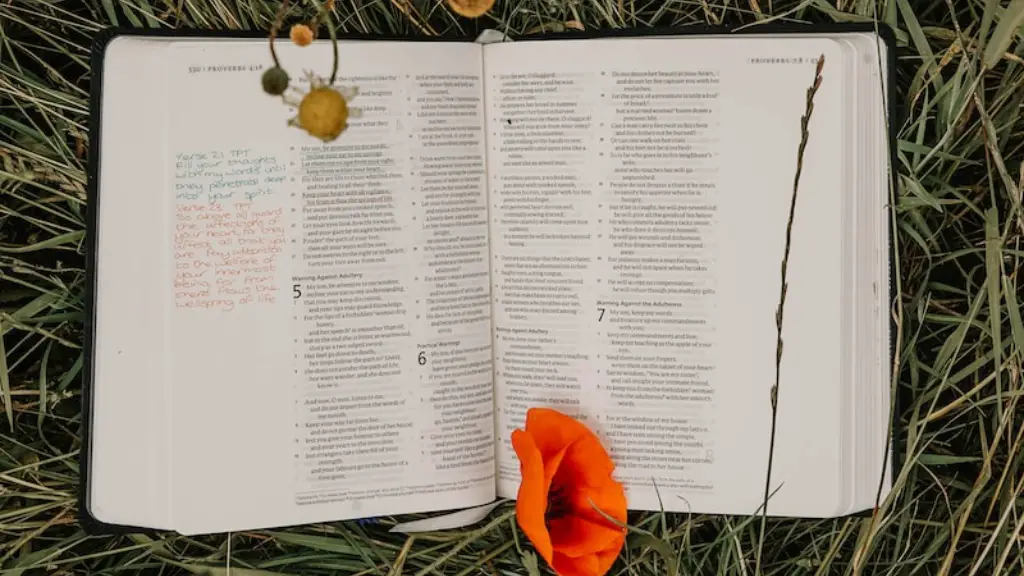Background Information
The Passover is a festival found in the Christian Bible that celebrates the liberation of the Israelites from slavery in Egypt. The event is referred to as the “Passover” because God “passed over” the homes of the people of Israel when he brought down the plagues of Egypt. The day is celebrated annually in remembrance of the Exodus and serves as a reminder of the struggles of being an enslaved people. The events of the Passover are described in the books of Exodus, Numbers, Leviticus and Deuteronomy.
Biblical Descriptions
The biblical story of the Passover begins when God instructs Moses and Aaron to demand that Pharaoh let the Israelite people go free from slavery in Egypt. After numerous warnings from God and several plagues, Pharaoh finally agrees to release the Israelites. In preparation for their journey out of Egypt, God instructs the Israelites to slaughter a lamb and spread its blood on the door posts of their homes. This sign was meant to signify that they were God’s chosen people, and as such they were to be “passed over” when the plague came that night. The plague claimed the first born son of every Egyptian family, but spared all of the first born Israelite males. The symbolism of this event, as signified by the lamb’s blood on the door posts, has since come to symbolise the suffering and redemption of Christ.
Festival Tradition
The Passover continues to be celebrated to this day by Jewish families all around the world. During the festival, a Seder (dinner) is held in every Jewish home which includes traditional prayers, foods and rituals that are meant to remind participants of the suffering of the Israelites in Egypt and their eventual redemption. The festival Celebrated for eight days, participants in the Seder are meant to put themselves in the place of the Israelites who experienced the Plagues and were later freed.
Symbolic Foods
There are certain foods that are regularly served during the Passover Seder that have symbolic meaning. The most notable is the shankbone, which symbolises the sacrificial lamb that saved the Israelites. Other symbolic foods include a mixture of nuts and apples called “Charoset” which represent the mortar used by the Israelites in their enslavement and roasted egg, which is a symbol of mourning.
Religious symbolism
For thousands of years, faith communities have interpreted the Passover to have both literal and allegorical meanings. From a religious point of view, the Passover has become a symbol of redemption from the suffering and slavery experienced in life, often seen as a parallel to the suffering and redemption of Christ. For Christians, this interpretation is further enhanced by the similar pattern of events experienced by Jesus, who was crucified and then “passed over” when God resurrected him.
Modern Interpretation
In modern times, the Passover has also come to symbolize freedom from oppression and injustice, often seen as a symbol of the struggles of immigrants, refugees and those affected by racism and prejudice. The holiday has also become a symbol of solidarity among different faith communities and those who are persecuted or persecuted for their beliefs. In this sense, the Passover serves as a reminder that all humans are the same, regardless of their faith or nationality, and are united by a shared experience of rejection, suffering and triumph.
Blood of the Lamb
The use of the blood of the sacrificial lamb as a symbol of redemption and protection from harm has been a consistent theme throughout the celebration of the Passover. In Jewish and Christian traditions, the blood of the lamb is seen as a sign of God’s grace and mercy, signifying a contract between God and his people. Moreover, the fact that the blood of the lamb was spilt on the door posts symbolizes how the death of Jesus, the perfect lamb of God, was the ultimate sacrifice for humanity’s sins.
Analogies and Perspectives
The story of Passover is traditionally interpreted as an analogy of redemption, often seen as a symbol of the liberation that comes from faith. This same analogy can be applied to the modern world, where in spite of the suffering and oppression experienced by many, there is still hope for those who choose to cling to faith in the face of adversity. The symbolism found in the Passover serves to remind us of the power of faith in our lives, and the resilience of the human spirit.
Relevance To Us
The message of the Passover is more relevant now than ever before. In a world that is facing increasing oppression, injustice and suffering, the story of Exodus serves as a reminder of the power of faith in overcoming even the most difficult of struggles. The sacrificial lamb is a reminder of how we too can be “passed over” when we rely on the grace of God in our journey towards redemption. Ultimately, the Passover serves as a reminder of the hope that exists even in the most desperate of situations.
Lessons of the Passover
When we look to the lessons of the Passover, we are reminded that in spite of the struggles we face in our lives, there is still hope. The symbol of the lamb is a reminder that even in our darkest hour, faith will still prevail. The event of the Passover is a reminder that no matter what we are going through, God will always be there to protect us, and that redemption is just around the corner.
The Power of Faith
The Passover reminds us that faith is more powerful than even the most difficult of struggles. By trusting in God and believing in the power of his grace, we can find the strength to overcome any obstacle. The Passover is a reminder that through faith, we can achieve freedom and redemption in the face of even the most difficult of trials and tribulations.
Transformative Nature of Faith
The Passover reminds us that faith is a powerful tool for transformation. By embracing faith and relying on the strength that comes from it, we can find the courage to face any challenge and turn it into an opportunity for growth. The Passover is a reminder that faith can be transformative, offering us the hope and strength we need to reach our goals and find redemption.
Love in Action
Finally, the Passover reminds us that love is a powerful force for good. The love of God, manifested through the sacrifice of the Lamb, is a reminder that we too can bring love and compassion into our lives. The Passover reminds us that by giving love and showing compassion, we can bring redemption into even the darkest of situations.



